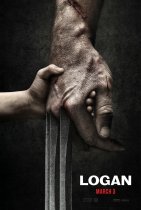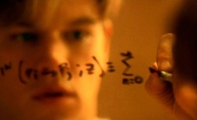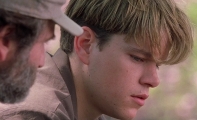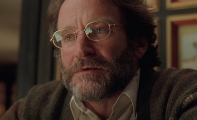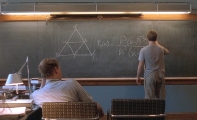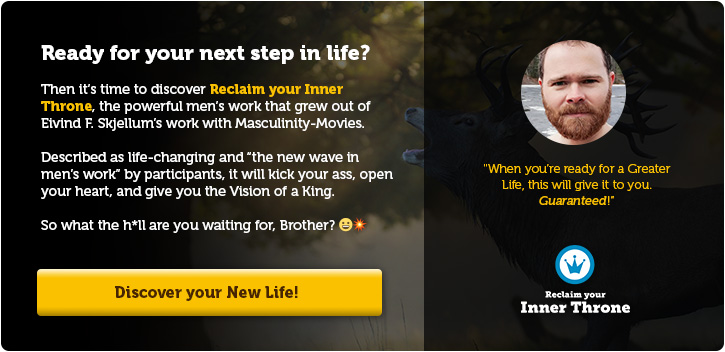Good Will Hunting (1997)
Synopsis
Good Will Hunting is the Oscar Winning drama from 1997 about Will Hunting’s journey to absolve himself of the ghosts from a childhood gone wrong. He is a troubled young man who has just been bailed out of prison by a Fields-medal winning maths professor. The prodigy is now torn between two worlds – the safe, small world of his Southie neighborhood and the intimidating world of corporate America, which hungers for his genius mind. To discover his true path, he will need some therapy…

| Genre | Drama |
| Production year | 1997 |
| Director | Gus Van Sant |
| Male actors | Matt Damon, Ben Affleck, Robin Williams, Stellan Skarsgaard |
Brilliant mind, wounded heart
by Eivind Figenschau Skjellum
Will Hunting washes floors at MIT. It’s honest, honorable work he tells himself. But when he comes home at night, he applies his brilliant mind to the study of advanced maths and the works of Shakespeare, Kant, Nietzsche et al. Will’s soul clearly aspires for more than the feeling of warm suds on his hands.
The Fourier theorem and applied therapy
Gerald Lambau is the Fields-medal winning maths professor at MIT who puts up a Fourier theorem on a chalkboard in the very hallways entrusted to Will’s mop. It is a challenge to his maths class, but Will is the one who solves it. Gerald starts a hunt for the mysterious genious and tracks Will down in a courtroom where he is busy pleading his own innocence after having assaulted a thug who used to beat the shit out of him in kindergarten (haven’t we all wished at one point we could do that?).
Gerald recognizes his genius and strikes a deal with the judge: Will is to meet with Gerald every week to work on more advanced maths and he is to see a therapist. When Will learns of the plans of therapy, he laughs mockingly. His guard is up; he doesn’t need therapy. Actually, many men “don’t need therapy”. It seems hardwired into our DNA to want to solve problems on our own.
Perhaps is it our caveman mentality; sitting alone in the wild, looking for game to bring home to feed the family, or looking into the flames that flickered in the dark of night, prehistoric man didn’t need therapy. He just needed his solitude or his ability get on with the hunt.
Perhaps this inherited male psychological trait is what causes many of us to think that admittance of inner struggle is a sign of weakness. Rather that I go under than admit to myself that I can’t hack it. Surrender and the humility required for healing is a challenge for many of us men. I believe, however, that this flies straight in the face of what true Brotherhood and a life well lived looks like.
Informing our hunting mates of our fears could save their lives in the event that we lose operational capacity in a stressful situation. Insisting on tackling life’s problems alone is real weakness and it is not in the service of our Brothers. Man was not meant to go it alone.
Enter Sean Maguire. He is the brilliant ex-classmate of Gerald ‘s whose life has gone down altogether different pathways of the soul. While Gerald thinks a life well lived is one in which one aspires to give to the world of one’s deepest intellectual gifts, Sean places emphasis first on being-ness, embodiment and human interconnectedness. We see this from how heartbroken he is from having lost his beloved to cancer.
We understand it from hearing how much he presses on the bench (embodiment practice), from how he stands up to Will when he disrespects his wife (hand wrapped around Will’s throat: “If you disrespect my wife again, I will end you”). Gerald is unlike all the other nice-guy therapists who Gerald first took him to. What sets them apart? In Robert Bly language, Sean has eaten his shadows. In fact, he seems to live in shadows.
Only a man who has eaten his shadows can get through to a wild and brilliant rebel like Will. The prodigy whose tough, macho exterior protects a hurt and unloved boy has finally met his match.
Welcome to your Senses, Good Will
After the troubling initial encounter between Sean and Will, Sean next takes Will for a stroll in the park. They sit down on a bench. The sun shines above them. There’s a slight breeze in the air. Swans are swimming in a pond, bathing their soft feathers in the reflection of a willow tree. Nature is Sean’s ally as he brings Will into his senses. “Michelangelo? You know a lot about him? Life’s work, political aspirations. Him and the pope, sexual orientation. The whole works, right. But I bet you can’t tell me what it smells like in the Sistine Chapel.
You’ve never actually stood there and looked up at that beautiful ceiling […] I can’t learn anything from you that I can’t read in some fucking book. Unless you want to talk about you. Then I’m interested.” Sean takes Will out of his home base in his head and into his body and the senses. Will hurt Sean when he, in a scene earlier in the movie, ripped his life apart analyzing his now deceased wife and his relationship to her based on a fucking painting. And he lets him know it. “I look at you. I don’t see an intelligent, confident man. I see a cocky, scared shitless kid.”
It’s probably the first time an elder has been radically authentic, loving and powerful with him. This is connected with great healing, as is always the case when powerful and authentic men meet the hearts and minds of boys. This scene is incredibly important so I include it below.
Will is the
Magician archetype, operating largely on the shadow side. After I wrote this review the first time, I read in Robert Moore and Douglas Gillette’s book on the King archetype (The King within) that a Magician archetype without the integrated King becomes someone who can argue anything convincingly, but believe in nothing. That reminded me of Will. The King archetype is incredibly important, but Will lacks it almost completely, having instead more of the Warrior in him. Magician archetypal energies combined with Warrior archetypal energies in a man whose Lover and King energies are weak result in a very dangerous psyche. It is the psyche of Nazi Germany. When I read the passage in the book, I realized that Sean functions in his King aspect to bring the Magician archetype in Will to maturity. He does so by opening him up to King and Lover energy (the former inaccessible due to inner chaos and feelings of inferiority and fear and the latter suppressed because the pain of lost parental love is so severe). Sean is the Axis Mundi for Will, integrating in him the higher and lower realms.
It’s not your fault
While Sean and Will’s relationship deepens, Gerald is becoming increasingly taken by Will’s genius. In one scene, he solemnly admits “Most days, I wish I never met you. I didn’t have to walk around with the knowledge that there was someone like you out there,” and continues with sadness in his eyes “I didn’t have to watch you throw it all away…”.
What Gerald doesn’t understand is that a kid who’s been pushed around so much – who has been abused by his parents while growing up – needs first of all to be seen, loved and acknowledged as a human being. We all grow up surrounded by people who want something from us. Many parents want their children to be the jewel in their crown and not the authentic, autonomous beings that they are. And since a kid will do anything to get love and acceptance from Mother and Father, we adapt.
When we grow older, we may find that we have some serious boundary issues. Our interior warriors may be too weak or too aggressive, all based on the sort of childhood we had. Either way we suffer. Will’s inner landscape – the kingdom of his heart – is so fragile that the warriors that guard its border are scared, neurotic and overly aggressive. He will not function in the role as boy genius in some big corporation like Gerald wants. He is too antisocial.
We all defend our parents from the responsibility of their actions. A child interprets the bad things that happen as their own fault. We drag that heavy load with us into adulthood and all our human relationships. At one point, we notice that we’re feeling heavy and we turn around to see a big bag of shit tied to our feet which we have been pulling through our whole life experience. It then becomes urgent to let it go. Looking into that bag for most men means uncovering mounds of grief and anger carrying repressed childhood memories.
Robert Bly has spoken of the enormous burden of grief men carry these days, of the childhood we never got, the destruction of the planet wrought by daddy’s oil company employer, the life-giving essential manhood which was stolen from us by industrialization and feminists. Unless you know what I’m talking about, you carry this grief too. Trust me. Turn around in the twilight hours and you may find the contours of it manifest before your hazy eyes.
Will lets go only after Sean, at a very vulnerable moment, repeatedly tells him “it’s not your fault”. Sean has unknowingly been helped by Will’s best friend Chuck, who in one scene challenges him, as does any good friend, to get his act together. “I would give anything to have what you got. If you’re still around when you’re fifty, I will fucking kill you”. Yet, when Sean makes his move, Will’s interior warriors stage one last stand in defense of his parents – and then Sean gets through.
Will breaks open and cries tears of letting go – of the hope that Mummy and Daddy will one day come through with the warm blanket of love which his heart still desperately yearns for. Only by accepting how flawed his parents and his childhood were is he now finally able to let go, claiming for himself, as does any man of maturity, the sweet burden of self-love. Such is the role of a mentor. Such is Sean’s gift to Will.
Conclusion – About a girl
Yes, of course there’s a girl. Don’t be silly. The beautiful and intelligent MIT student Skylar has already got under Will’s skin and into his heart. He may in fact be falling in love, that scary and delicious feeling which signals his loss of control. So when Skylar earlier in the movie asked to take him to California, he freaked out, fearful of the mysterious landscape of a woman’s loving embrace.
Will has now broken through some major childhood shit; he has eaten some of his shadows. He has taken the job that Gerald found for him, but there’s something he has to do first – he has to go find the girl who he wrongly disclaimed on the grounds of not loving her. Of course he loved her, he was just afraid of letting go of his childhood identity as inherently unlovable.
Free from that prison, he inherits Sean’s aspiration to find real love in his lifetime, and as we leave Will and the credits roll, he is en route to make right what was wrong. Will has finally found his way down from his heavily guarded intellectual tower; what better way to celebrate his return to life than with a woman?
Powerful ideas from Good Will Hunting
- Most modern men (Gerald in this case) have not eaten enough of their shadows to provide solid, integrated mentorship and fathering of boys.
- Dragged in the shadow behind every man is a burden of anger and grief. Releasing it involves releasing our parents from the responsibility of making things right again. They probably never will.
- We all need mentors to assist us in doing the soul work necessary for maturity.
- We tend to defend our parents from the wrongs of our childhood and rather blame ourselves for what went wrong. But a child can not be expected to take responsibility for the emotional problems of an adult. As an adult, we must now recognize this and let ourselves feel anger towards the ghosts of the past that merely look like our parents, but are really not.
- After the anger comes the grief.
- Our interior warriors form through our often imperfect relationship with our parents. We become too protective of our boundaries (machismo) or too careless with our boundaries (new age flow boy). Maturity involves finding balance.
- Men tend to hide in their heads to escape the pain and grief held down in their bodies.
- Love involves risk and a lack of control.
- A true friend kicks us in the ass when we piss away our lives, even if it hurts.



